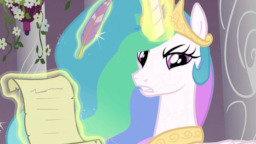
Chapter XII: Iron Gall
He wasn’t aware of how long he stood there, with his head pressed to the mirror, with his hoof under the stream of the open tap, with the harsh fluorescent light revealing the pulsing red of the blood in his closed eyelids. He was aware only that nopony had seen him retreat here and that he had the bathroom all to himself. He was also aware that at some point a janitor had come in and, without a word, started going through her perfunctory motions, running the mop on the floor between his legs as if he were another bathroom fixture.
He wasn’t aware of how long he stood there—but he did care.
If watching media coverages of trials had given him any indication, he knew that when he stepped outside there would inevitably be a host of horseflies, with their cameras and microphones, asking him to comment on what happened and his interpretation. Yet he had no comment, no interpretation, and he had not the energy to try to formulate them. His duty compelled him to answer; yet even declining to answer would in itself be an answer, and one that would be unflattering. The first job of my career, thought he—and already, my career is over. Perhaps some greater scholar of the law would be able to rebound from this defeat, would know and would gleefully produce the relevant passages to the sight of the world, statutes that had been so obviously disregarded, making the ruling so obviously wrong—but he couldn’t.
With a bitter laugh, he remembered that the bathroom in which he was now lingering, the mirror against which he was pressing his head, was the same bathroom, was the same mirror, from the time when, as a student of this very school, he had had to give a presentation and, having a panic attack in front of the class, had retreated here and had spent some considerable time in the attitude in which he now found himself in. The wound that memory had cut into him had mostly healed with the salve of graduation, when all that that he had thought constituted the world—what grades he got, what his teachers and classmates thought, who said what about whom, who engaged in clandestine rendezvous in the backseat of wagons with whom—had all at once disappeared, and before him emerged a new, enormous world where he could start afresh, a universe whose immensity would swallow any error he would inevitably make; now, with his injury that undoubtedly all of Equestria would see and remember (“They’ll be studying this case, and the choices you make, for years to come”—ah, Fine Print! painful memories form an infinite chain, to unearth one is to pull the whole ugly sequence before you), here he was exposed and shamed to the world, and to him there was no vessel to aid in the interplanetary escape he desperately needed.
He eventually did leave the bathroom, when hunger drove him out like some scurrying quarry. He was forced to stop at the horrible sight of his client who stood at the entrance of the bathroom, obviously waiting for him.
She towered above him, the loss notwithstanding; on the contrary, she seemed more animated and proud than before, more so than a princess ought to be, or so it seemed to him. He didn’t look too hard—the thought of looking at her directly made him nauseated with shame.
“I thought I might find you here,” she said with a grin.
“I’m sorry to keep you waiting, Your Majesty,” he mumbled.
“Don’t worry about that; I completely understand. I’m sure you’re exhausted. But if you have a modicum of energy left, might you permit me to ask you a few questions?”
He didn’t, but he would; he was pretty sure that the last pony working for a princess who refused a “request” had had his head cut off. “Mmhm,” was all he said.
“What are our options from here?” she said. “Is there a court of appeal?”
“No,” he droned. “You can apply to have a decision reviewed, but those are almost never accepted. Even if it is, it will be the Tribunal who does the reviewing.”
“The same commissioners do the reviewing?”
“No. Different ones.”
“Well, don’t despair!”
“Your Majesty, do you honestly believe that the new ones will be any more reasonable than the old ones?”
Something about her nonchalance irked Due Process. Perhaps it was that she was taking the losing of ten thousand bits with as much seriousness as if she had lost a nickel. Or maybe it was that she was refusing to regard a blow to her integrity, which was necessarily a blow to the institution of the monarchy, with the gravity he thought it deserved.
“I suppose not,” she said with a smirk. “But I wish to retain your services a bit longer. We have to—”
“Thank you, Your Majesty, but I’m not interested.”
“Oh, don’t be silly,” she pressed. “Of course, I’ll pay you this time.” And leaning closer to him, dropping her voice to a whisper, all the while fixing him with a glare whose intimacy unnerved him, she added: “I can assure you that the Crown gives handsome salaries to its employees.”
“Well, in that case—” Due Process reflexively began, but stopped. He had always told himself that if somepony were to offer him money for his time and advice, he would do it, no matter how odious the person or task; after all, that was what justified the existence of lawyers. And hearing about the money that was being offered him now, knowing how hard up he was at the moment, knowing hard it was for new graduates to find meaningful employment at reasonable hours, his brain screamed to his body to take up the offer—but after that disgrace of an affair into which he had thrown the entirety of his forces, all manifesting in an otiose end, his exhausted heart couldn’t muster up the will.
“I’m . . . sorry, Your Majesty, but I can’t . . . not after that horrible defeat, I couldn’t . . .”
“Defeat?” gasped Princess Celestia. “Truly, I ask you, Esquire, had we been attending the same proceedings?”
“Your Majesty?”
“After such a stellar victory, how could you ever come to the conclusion that we lost?”
“Because—”
“Because why? Because I was ordered to pay money? But why should that matter? So what if I must pay for somepony’s hurt feelings? It’s just money and, really, all things considered, an insignificant amount in the long run. No, Esquire, whether they cared to admit it or not, the Tribunal ruled in favor of us. You know, I briefly skimmed some of the judgments of the Tribunal, and I found that they usually order a restructuring of the discriminating institution and absurd, expensive training programs of dubious utility, along with an award of damages to the complainant for the actual discrimination suffered. But they explicitly recognized your defense as valid and awarded no damages due to the School’s discrimination per se. They ordered no corrective measures the School is to take. Whether they were aware of it or not, they sanctioned the existence of the School. Oh, sure, perhaps the ruling might encourage some ne’er-do-wells to file frivolous complaints against us, but that can be easily prevented: just a few instructions to my dean and the interviewers about the selection process. I doubt the Tribunal, as corrupt as it is, can politically outmaneuver a princess! So, you see, Esquire, you won.”
“No, Your Majesty,” said Due Process, “I lost. Though you’re right about the outcome, I lost because . . . well, you remember what I said to you on the first day: it’s my job as your attorney to remain emotionally impartial. I got emotional, made a fool of myself, and by extension made a fool out of you. It is a game of politics; that’s what matters, at the end of the day: who’s the biggest fool.”
“Objectivity is a myth. Any professional worth anything cannot but be emotionally attached to his work.”
“Nevertheless, lawyers are not permitted that luxury.” He gave a bitter snort. “Maybe that’s why people hate us: they expect something that’s impossible.”
“I still want you for something though..”
“You don’t want me. I’m unfit to represent anypony.”
“Wait till you—”
“No, Your Majesty, I’ve made up my mind. I’m retiring. This is not the profession for me. Regardless of how you feel about my work, my nerves aren’t, and will never will be, up for it. I need to choose something different. After all,” he said, with a sad smile, “it was you who said it wasn’t too late for me to choose something different. I guess you were right all along.
“Farewell, Your Majesty.” He bent down on his knees to kiss her hoof and was just about clobbered in the head as she raised it rapidly to him—in a much different manner than he had expected. He looked up at her; and seeing in her eyes her meaning, he felt a joy radiating from within him, not powerful enough to manifest on his features, but enough to invigorate him long enough to make this final gesture. He grabbed her shoe with both his forehooves and, in the manner of friend, kissed it, kissed it passionately, in the manner of a worshiper.
He heard Princess Celestia draw breath, as if she were about to say something, but he didn’t leave her time; words spoken by a princess required consideration, and he didn’t want to consider. At once, he took off toward the entrance of the school.
Only when he threw open the door to the main entrance did it occur to him that there would be reporters waiting for his emergence. Nauseated at his neuroticism, he cursed himself and his incompetence for not having taken the two seconds to think about finding an alternate exit from the building. Blind to the world, willfully blind to the consequences, he fell to the ground, and the terrible curse that had been brewing within him since he had heard the opinion of the Tribunal finally erupted from his throat in the most profane, the most egregious of utterances, which he projected to the sky, to the world, and to the filthy earth.
He got up, ready to face the mockery—but, to his surprise, the courtyard in front of the school, save for the gaudy plumes of the Royal Guards posted at intervals down the sidewalks, was completely vacant.
He was now aware that what he thought was sweat clinging to his clothes was actually the result of a heavy downpour. Drenched with rain, he looked up at the heavy drops falling from the heavens and laughed, laughed bitterly at the realization that the public’s desire for drama was not strong enough to overpower their even baser need for shelter.
The rain felt good on his neck, its coolness bringing him much needed relief—then the coolness at once turned to clamminess, and he realized that his clothes and his feathers were too drenched in order to fly home. He’d have to take the bus, and he did not relish the idea of having to spend the next hour of his life dripping wet while squished between two fat animals as they masticated chips by the hooffull, daring, by their audacity, their fellow commuters to cross the social barrier that enjoined them from calling the disgusting pieces of lard the vile sack of chips they were (and not the kind of chips whose bolus they would ejaculate from their gullets with such glee), confident in their knowledge that Equestrians were much too polite to say the obvious. With a heavy shrug of his shoulders, he started off.
The bus stop stood on the other side of courtyard; a straight line from Due Process to it cut across a dilapidated school lawn. A member of the Royal Guard was pacing back and forth on the pavement in front of the lawn; his slight frame, which his mountains of armor were not able to conceal, the irregular spacing of his steps, and the way he slouched, betrayed his status as an officer.
Due Process thought nothing of him and tried to walk past. But the second he put a foot onto the lawn, the officer accosted him.
“That area is blocked off,” said he. “You’ll have to go around.”
“My bus stop is just over there,” replied Due Process, pointing.
The officer shook his head. “We’ve cordoned it off for the princess’s and her entourage’s safety. You’ll have to go around.”
Due Process shrugged and took a step in the other direction—but then stopped. He turned back and sized up the officer, noticing that he was wearing glasses. From this, and from the officer’s officious words, spoken in a thin, matter-of-fact voice, Due Process knew that he was an academic intellectual—and, given that he was in the Royal Guard instead of working a better-paying job, likely a second-rate one at that. And Due Process, remembering the history of his mansuetude, his diffidence at the Gala, with Fine Print, Princess Luna, with Res Judicata, Petty Nicety, with all that awful lot, felt an immediate revulsion for this pony, for he reminded him too much of the path down which had been leading his recent choices: the pompous masquerading as somepony more important than he, knowing all the while deep down, but pretending otherwise, that he was in substance nothing.
As a body heats up to destroy a virus, his revulsion heated to destroy his cowardice; it boiled over and turned to rage. He took a step toward the guard, puffed up his chest, and flared out his waterlogged wings.
“By what right,” he spat, “by whose authority, do you, an officer of the Royal Guard, presume to order me, a civilian? Where exactly does the Constitution give you that power?”
There was a marked lack of shock in the officer’s reaction. “Not a constitutional right,” said the officer simply, as if he had expected the question and had known what the correct response was, “but a contractual one. I know you; you’re Her Majesty’s attorney. When you agreed to provide services to Her Majesty, your contract included a clause wherein you agreed to accept the protection of the Royal Guard and follow its orders that pertained to your and her safety.”
Due Process stumbled. Since when did ponies actually read contracts, let alone Royal Guards? The last conception of the world he thought he knew was obliterated.
Due Process scoffed. “You were a lawyer before; only a lawyer could say something so inane.”
“Nope,” said the officer with a grin, “paralegal.”
“Go to Tartarus.”
“Already there. Nevertheless, as long as you’re providing services to Her Majesty, I can’t let you past. Go around.”
“Well, in case you haven’t heard, tin-head”—and, overflowing with emotion that left no room for reason, he did something unthinkable: he flew up and, on pronouncing the word tin-head, he contemptuously flicked the officer’s helmet. Immediately, he had known that he had made a terrible mistake, and he knew that within a second every single bone in his body would be crushed by a bevy of enlisted muscle who undoubtedly saw what happened and who would fly to the help of their superior—he knew full well what would happen. He accepted it, cringed, and waited for the blow.
A second went by . . . then two . . . then ten. Nothing happened. Due Process looked around; save for some statue-still Royal Guards posted at intervals down the courtyard’s walkway, there was nopony there; nopony was coming.
Twice now had he been absolutely sure of a horrible outcome—first with the reporters, and now with the Guards—that ended up not being the case. In the face of this incontrovertible evidence of his flawed thinking, a new feeling invigorated him: all of his biases, all of his predictions, were probably more wrong than were right, no matter how certain he felt of their veracity. This knowledge of his ignorance empowered him: no matter how bad, or good, the world and his future may seem, there was almost certainly something he could do to make it better, or worse. In every possible path the future laid open to him, he saw only the vast unknown and the unpredictable—and he couldn’t help feeling elated.
“In case you haven’t heard,” repeated Due Process, hovering the best he could despite his waterlogged wings, and unable to suppress his smile despite the rain and cold. He didn’t try the insult or its gesture again; that would’ve been greedy. “In case you haven’t heard, the proceedings are over. We lost, and I made a fool of myself. I’m no longer in the services of the princess.”
“Are you sure about that?” said a female voice, at the sound of which, in a second, the officer snapped to attention, trembling under the effort of trying to hold his sixty kilograms of armor steady.
Princess Celestia stood behind Due Process. Her horn glowed pink, and surrounding her was a rosy bubble off which the rain bounced.
“At ease, Lieutenant,” said she; and the officer immediately slouched, letting out a heavy sigh. “I’ll escort him from here.”
“Princess,” said Due Process, “I’m flattered, really, but I’m not—”
“I know, I know,” replied she, “but I feel too passionately about this issue and am too impressed by your courage and dexterity to let you have the final word. If I offer you a ride home in my carriage, will you allow me to try to convince you on the way over?”
At first, Due Process felt only a tingling on his skin; then, gradually, he felt as if his bones were being pulled and compressed. He felt his muscles twisting uncomfortably; his suit wrinkled and began to grow dark; involuntarily, he trembled, and he noticed that the gyrations of his body coincided with the flickering of the colors of the princess’s horn.
A snap, and he felt as if his organs had torn free from his body; when he looked, he saw a blob of water suspended in the air next to him, glowing with magical energy. Then the energy disappeared; the bubble fell and smashed against the pavement with an audible thump, spreading out in a tiny puddle. He noticed that he was no longer looking at the outside of the pink aura that had been keeping the princess dry; it surrounded both him and her. His mane and suit no longer clung to him with moisture; he was now completely dry.
“A royal carriage beats the bus,” said Princess Celestia with a wily smirk. “Don’t you think so?”
When they had moved ten or so meters away from the lieutenant, Due Process said: “Your Majesty, even if you disagree, if I lack the confidence to perform, then, ipso facto, I can’t. I don’t believe I’m fit for courtroom dynamics.”
“You’re right,” responded the princess, “you’re not.”
“Then what do you want me for?”
They had reached the carriage. “Magic Muzhik!” the princess called out.
A figure leaped down from the pilot seat of the carriage, completely enveloped in rain-deterrent clothing so as to cover all of his skin; he seemed more poncho than pony. He threw back his hood and smiling from underneath his umbrella-shaped golf hat was the coachpony.
“You asked, your Worsheep?” said he.
“Yes, I did,” responded she. “Magic Muzhik, you’ve served me loyally for a decade. Your performance has been impeccable, and I’m fain to offer you a promotion.”
Magic Muzhik blushed. “I flatter you, My Majeesty.”
“Yes, I’m promoting you to the position of Royal Crier.” She levitated out to him a laminated scroll. “Please cry this.”
Magic Muzhik took the scroll in his own levitation aura and squinted through the rain. “Be eet here-bee prononc-ed,” he read, “and procleyemed zhat Her Majeesty here-bee extends to Due-y Process, Ees-queer, zhe Po-see-teeon of Adveesor to zhe Crohn for Unee-lateral Leegal Affayers, for wheech zerveeses she offers—”
“You’ll need some training, of course,” said Princess Celestia, taking the scroll back from the coachpony.
“I don’t understand,” said Due Process. “What do you want me for?”
She didn’t respond till they had both gotten into the carriage and had started off. “Do you think me irrelevant?” she asked, as if she had forgotten about their previous conversation.
“Irrelevant?” said Due Process. “I don’t know what you mean . . . do you mean in some philosophical sense? I don’t know; I haven’t thought about the meaning of life as such.”
“Esquire,” she said, and there was a bite to her voice. “If I keep you around for any purpose, it’s because of your ability and education, not your personality. If I ask a question, it’s because I want a legal opinion.”
“Yes, I’m sorry, Your Majesty, of course . . . well, if you’re asking if you’re irrelevant legally, then the answer is an unequivocal no. You’re the head of state, or, at least, one of. Every single law of our land is because you’ve proclaimed it so. No princess, no law.”
“I’ve not been involved in the conception of any laws in a long, long time. They come to me in the form of papers to sign, and I’m told that Parliament wishes, after much debate, to give my assent. If I’m just a rubber stamp, then what’s the point of me? How can I justify using tax money for my stipend if I’m really not necessary?” She paused and then turned to face him. “Well, no longer. I remember what you said to me when we first rode together to the Tribunal. The point of having a sovereign is to overrule the people when they’re clearly being insane. That’s why I need you. You drive yourself mad trying to resolve the contradictions in the common law. You can help me decide which laws to repeal and help me with the wording of new ones—not just wording, but their logical and legal consistency. You wouldn’t have to be in the public eye; the public wouldn’t even have to know your name. You’d work in the palace and have all the benefits of my entourage, and your salary would be—”
“Yes!” cried Due Process. He picked up the princess’s hoof and showered it with kisses. “Yes, yes, yes, Your Majesty! I accept!”
“Splendid,” said Princess Celestia, wiping Due Process’s excess loyalty from her hoof on the leather seating of the carriage. “I’m beginning a project that shall span many millennia, should it prove successful: the project is to rewrite the laws. I was looking at the Pony Rights Act, and I couldn’t help but notice that they’re extremely poorly written; liberally interpreted, what they describe as prohibited acts could describe any and every act between ponies. Laws should not be poorly written, because a law that is poorly written means it’s been poorly thought out.”
“On the contrary, Your Majesty,” reflexively interjected Due Process. “Laws that are poorly written have been very well thought out. You see, the meaning of a poorly written law is not obvious to the layperson, so it serves two purposes: One, by having a law that means everything and nothing, it serves as a way to keep a population in check with fear; you can’t control innocent people, so make everything a crime, make everyone guilty, and thus a government can retain its power. Two, if the law is not able to be understood, naturally lawyers will have to retained to interpret it; it’s a form of job security for us.”
“If this goes well,” said Princess Celestia with a glare, “I shall be continuing this unilateral amending of the laws. Of course, the body of law is too vast for me to get through in any reasonable time span. No, should something come to my attention, and should it be plain and obvious to me that something needs to be amended, I shall do it, but only on the advice of my advisor. This shall take a very long time, if not forever, and you shall be the first to fill a new position by my side. The Advisor to the Crown for Unilateral Legal Affairs shall come to be an esteemed position in society—therefore, if you are to be the first in the line of holders of this prestigious office, you cannot have such views as the one you just spoke. After all, it’s your youth, your purity free from the cynicism of experience, that has attracted me to you. Looks like I got you just in time. I hope it’s not too late.”
Due Process blushed, pinning his ears. “Yes, of course, Your Majesty. Forgive me . . . I swear to you, I shall never grow cynical.”
“First item,” she said, “for which you will help me work out the precise wording: be it denounced that Her Majesty Princess Celestia, the light of the world, etc., etc., hereby decrees—” She stopped short.
“What’s wrong, Your Majesty?”
“It’s just that . . .” she sighed. “I remember learning about the rise and fall of kingdoms. It’s always the same: a novel, rational ruling paradigm emerges to replace the old, superstitious one, usually after a bloody revolution. With the new paradigm, things begin capitally—so it seems, at any rate. But then some ‘intellectual’ identifies a failing and takes it upon himself to ‘correct’ it with a small, shall we say ‘addendum,’ to the theory that looks just like an exception to a special case but which, at its root, runs contrary to the idea that gave rise to the society in the first place. At first, the damages caused by this contradiction are too small to notice in this otherwise prosperous society. But they show soon enough; society becomes more divided until a civil war. Then out of the ruins emerges a novel, rational ruling paradigm and . . . how can a ruler be sure she’s doing the right thing?”
“Your Majesty?”
“If I do nothing, then I’m useless and am to blame; if I get involved, then I’m a tyrant. Every leader in history has thought himself the exception and unilaterally created rules he thought to be fit; every leader who has done that is considered a tyrant. If I do this . . . then what am I?”
For a while, Due Process said nothing; then, as if the gears in his mind caught a motor that was beginning to churn, he droned: “Pony Rights Tribunal Rules of Procedure, Section 1.6: ‘The Tribunal holds the supreme Power over the Conduct of Proceedings and may, at its sole Discretion, use, or enforce, Measures other than the Ones normally prescribed by traditional jurisprudential Thought.’” He paused, allowing his words to be fully absorbed. “Or, to put it in an actual pony language, Your Majesty, the Tribunal has, de jure, the authority to dispense with the standards that have made up the backbone of our legal system for centuries—standards such as the presumption of innocence, the adversarial system, and the right to a trial by jury.”
The rain beat down on the carriage roof; the speed of their flight amplified the frequency and sound of the splashes.
“Your Majesty, our current legal structure was founded, primarily, to prevent the tyranny of the majority. History has shown that there is absolutely no reason to believe that tyranny of the majority is any less pernicious than tyranny of the dictator. If it is an inevitability that society should swing between these two extremes, then it is my opinion, as your Advisor for Unilateral Affairs, that right now we have swung too much to one side. The Constitution describes your office, and it is obvious from its wording that your office exists to provide the sober opinion that an emotional people are unable to provide. This much is self-evident from even a cursory analysis of our body of law: we have Parliament to protect us from you—but we also have you to protect us from Parliament.”
“That explanation may satisfy the philosophers of law,” responded the princess, “but I have other aspects to consider. If I take any action against the PRAT, regardless of any reason I may give, the people will undoubtedly say that it was only because I personally was involved.”
Due Process blinked. “Well . . . of course, Your Majesty. That is precisely the reason.”
She frowned. “My office is supposed to be for the public good; to use it for selfish reasons is corrupt.”
“But, Your Majesty, you weren’t aware of the PRAT’s corruption, couldn’t possibly have been aware of it, till you experienced it firsthoof. The body of law is too big; you can’t possibly have a complete knowledge of its letter and enforcement. Time is a finite resource.”
“Then, of course, the people will say why didn’t I abolish this or that other law, that there are other things more important.”
“And they are free to think that. And this is why Parliament exists: so the people can bring to the attention of the sovereign certain laws that need abolishing or enacting—and on the advice of Parliament, you will do so, as you’ve always done. Do not think for a moment, Your Majesty, that what you now want to do is historically unprecedented.”
“Tyranny is also not historically unprecedented.”
“Your Majesty, we must not allow ourselves to succumb to prejudice. Just as a law enacted democratically is not automatically fit for a free and democratic society, so a law enacted unilaterally is not automatically unfit.”
Princess Celestia trembled. The words sounded so innocent, so just and sober. But she was used to hearing innocent-sounding words being used to convey malignant aims so often that at first she suspected something evil and dark lurking within the little lawyer was now peeking its tentative head out of its burrow to see how it would be received; she thought that beneath his suit and tie was not skin but the scales of a dragon. But when she looked into the little lawyer’s eyes, she saw staring back at her the innocence of a child, a consciousness untouched by anything corrupt. In the glance they exchanged, he communicated his fallibility, but a fallibility shown plain, with no attempts to hide it, as if to say: “This is all I am; this is all you are; let’s make the most of it.”
Princess Celestia sat up straight, as if terminating their personal conversation to address a much larger group. “Be it denounced,” she declared, “that Her Majesty Princess Celestia does hereby dissolve the Pony Rights Administrative Tribunal and all its constituents, whose power shall henceforth be reserved to the Crown for its pleasure.”
“Wait just a moment, Your Majesty.” Due Process opened his briefcase and from it withdrew a parchment, one of his feathers—he stored one, for he hated plucking his own every time he wished to write—and two inkwells. Placing the inkwells before her, he said: “Iron gall or carbon black?”
And then he laughed—it was the pure, innocent laugh of a child. “What a silly question,” he chortled. “For this new beginning, the choice is obvious.”

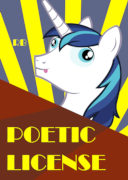


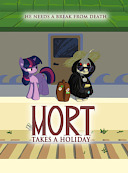



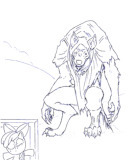

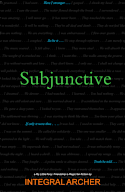

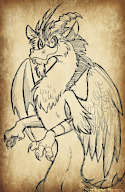

I'm suddenly taken back to the repeal of the Human Rights Act, and suddenly see this fic in a new light.
This is my second favorite pony courtroon drama I've ever seen /read. I still like the Phoenix Wright one a little more, but this was still excellent and a fun read. Great job!
Wonderful! And a good ending for it too. Fitting.
Much to think, though.
Thank you.
I often find these sort of stories a difficult read - simply because I find it cuts a little to close to home for my entertainment, when I am trying not to stoke my building ire at the world around me.
The final chapter put it over the top, though, when I finally understood what you were going for. While I agree with the sentiment, I'm afraid my outlook is somewhat more... bleak.
Though I would trust a benevolent leader who has ruled for longer than many human nations was existed (bare minimum) with sufficient competance to not have to be concerned, personally. I'd trust Celestia on her worst day over any current or former human leader.
...
Actually, I'd trust the robot overlords out of stuff like the Matrix or Terminatot or something over any current or former human leader at this point, myself.
(Actually, this is one area where - albiet through impliction, rather than outright statement - the show perhaps is closer than pretty much anything else outside of Princess Celestia hates tea, in regard to how such a figure would actually affect society...)
Great story! 10/10. I love how thorough and at least seemingly realistic the tribunal scenes are. The comedy is strong but not overdone. Excessive zaniness doesn't crowd out the mature humor of the piece. I really felt like Due Process was a character with depth and I was never quite sure what he would do, which is a whole lot better than a lot of characters that exist to produce one-liners and nothing else.
This story truly deserves much more attention than it has received.
So a sort-of happy ending. Due Process' relationship with Fine Print never really got wrapped up, but that's kind of minor as far as plot threads go. PRAT is an obvious parody of real-life human rights tribunals, which reading their judgements can be mildly infuriating. All that's really required is for Luna to add her signature as well to the dissolution of PRAT.
What's really the meat and potatoes of this fic is Celestia's own internal thoughts (and what she later articulates to Due Process) on her philosophy of rulership. Such things as her being the body of the law, her making the laws and upholding them, attempting reformation of the legal system, how she's seen much of reform attempts basically repeat themselves in a constant cycle, etc. That would work a lot more spun-off in its own fic that doesn't have such a blatant , ridiculous villain like PRAT here.